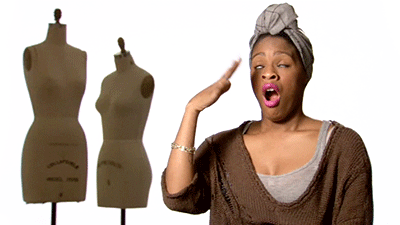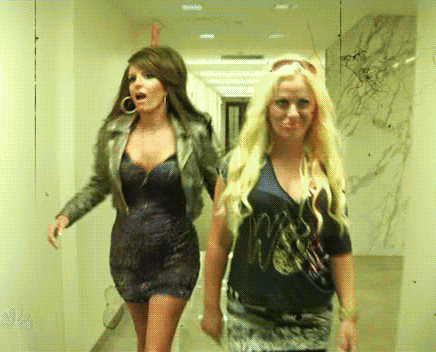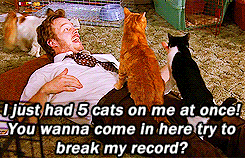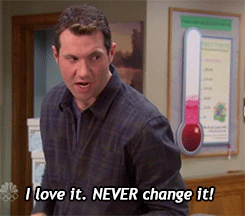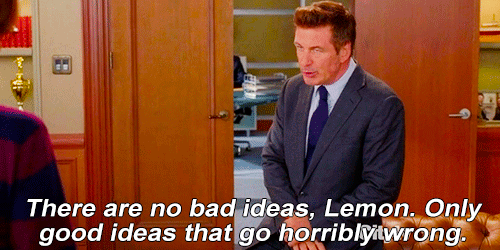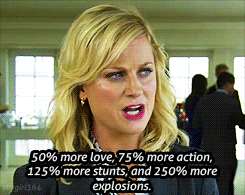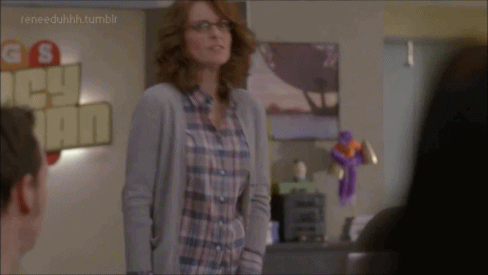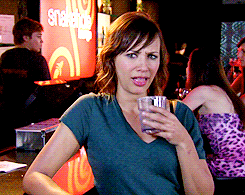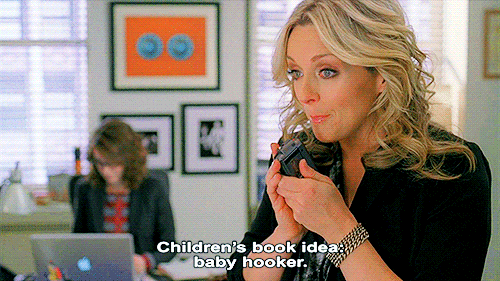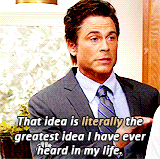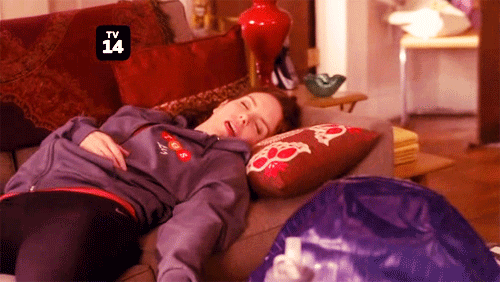I normally don't watch competition reality shows for longer than a season or two. The twists and challenges get repetitive. The contestants are unlikeable. Project Runway, however, is the exception. Maybe it's all the pretty. Maybe it's the inherent wonderfulness of mentor Tim Gunn, but I've been devoted to PR since it premiered on Bravo, many years ago.
In recent years, as I've pursued my own creative dreams, I've come to see that everything one needs to know about writing/ publishing you can learn from Project Runway. Don't believe me?
Preparation
Every episode starts with some sort of fashion challenge and the way the designers approach the challenge is an individual combination of market/ materials/ inspiration that mirrors the way writers start books.
Some people sketch and make a detailed list of fabrics, notions. (If they were writers, they'd be 'plotters.')
Some people go to Mood and find the perfect bolt of lime green crushed velvet and go off on a lime green cloud of inspiration. (Or 'pantsers' as we call them in Writer World.)
Everyone has their own style and methods but one thing you see from the contestants who make it to the top is they are confident in their craft. They are expert enough that they can be flexible and nimble when all of a sudden they have to make a day-to-night outfit for Heidi Klum's chihuahua. If they were a sketcher/ plotter, they can still come up with a new plan on the fly. If they were winging it on a cloud of lime green velvet, they don't melt down when their yardage is insufficient.
In other words... no matter how they start their book, they are resourceful and talented enough to finish it, despite the challenges that arise.
Feedback
Whether it is Tim's feedback in the workroom or the judges' critiques on the runway, feedback on Project Runway is EVERYTHING, as it is in publishing too.
Think of the workroom feedback as what you receive from your critique group, or your agent. This is your opportunity to revamp,
pr-tim-3
...trash...
pr-tim-5
...or back in their adoration.
pr-tim-4
You don't have to respond to their feedback (which I'll get into more, later) but you have to listen to it. And consider it. Because Tim Gunn isn't trying to screw anyone over. He wants the designers to succeed. As a mentor, that's his job.
The Runway critique is also super important. Think of Nina, Heidi and Zac as your editors and publishing professionals. If you watch Project Runway you'll see the difference between professionals and the amateurs (and it has nothing to do with how much money they make.) The professionals thank the judges for this:
pr-nina-2
and this..
pr-nina-1
And even this...
pr-nina-3
The Amateurs argue, get defensive, cry. The amateurs don't understand that Nina Garcia wants to find the next great designer to feature in Marie Claire. Zac Posen wants to see talent and innovation. Heidi Klum wants to wear something edgy and sexy.
In other words, they want the best on the runway, just like publishing professionals want to be swept away, inspired by and make a lot of money off your book.
But they don't want to settle. And they don't want you to settle. And if you're arguing and pouting and crying about their critique, you're not grabbing the chance to learn how to be the best.
So learn the value in a professional critique and then blow them all away.
Editing
I've written an amazing blog post about editing
. But to really see how to work with an editor, watch when Tim comes into the workroom to give the designers his (always constructive) feedback. When Tim says, "rethink that" "needs editing" or even, "start over" the professionals do what he says. They rip seams apart, shred sleeves, chop hems. And the non-sewing people at home (like me) are shocked at the destruction - how could they? How will they ever make another dress?
But professional designers - and professional writers - know that there's nothing that can't be fixed. Your darlings may need to be sacrificed at the altar of Saggy Middles. You may have to start fresh. For non-fiction authors, I imagine that editing must be even harder - what do you mean, you don't think my story about my tenth birthday party is fascinating? That was the day I didn't get a pony! How could anyone not want to learn about this rare Peruvian fern I researched for five months?
Designers and writers (heck, all creatives) must ask themselves what their goal is - a professional, cohesive, finished product? Or that stray (yet beautiful) sub-plot about a meandering butterfly that's a metaphor for lost innocence?
I think you know what Tim Gunn would say.
pr-tim-1
Voice/ Brand
These are two inter-related concepts that some writers really have a hard time understanding but I think if any writer watches Project Runway, they will eventually get it.
As the season goes on, you'll invariably hear the judges discuss a designer's point of view. Or their aesthetic. Or whether "they have something to say as a designer." By the time the final four are developing their collections, viewers have strong visuals of what a designer's voice or brand would look like.
Let's play a game with these three examples. Pretend each look in each photo is a book, written by the designer. Which writer would have a consistent voice and which wouldn't?
Yes.
Yes.
Er... maybe?
See what I mean? And if you watch the whole season, paying attention to design choices and designer reactions to challenges, you'll soon see how a creative person should stay true to their vision and voice even when faced with creative and practical challenges.
How to Ignore the Noise
Maybe this is the most important thing for writers to learn from Project Runway.
It goes against a lot of what I've said.
And yet it doesn't.
Any successful designer on Project Runway has to, at some point, ignore the haters, Tim Gunn and yes, the judges.
Note I said: Successful. Not winning. Not best-sellers.
There are successful designers who don't win. Who are sent home. But they walk away from the runway feeling confident, knowing they did their best work and stayed true to themselves.
Most of the successful designers don't win, actually, Because there can only be one winner. But winning isn't the coolest part of Project Runway, anyway.
The best part of this show are designs like this:
pr-bridge-dress
A dress inspired by the Brooklyn Bridge shouldn't work. On paper, Nina would have worried about the "taste level."
But damn, that's cool. It's a dress that looks sort of like a bridge... but it's a dress! And yeah, it's kind of weird, but I've never seen a dress that looks like a bridge that's also kind of... sexy. Huh. Sexy bridges. Who knew?
And a dress that changes color in the rain? Could really make up for a bad hair day.
pr-rain-dress
These kinds of things aren't created unless a designer says, 'you know what? I'm going for it. I have the skill, the imagination and the ovaries to make something that's never been made before."
So yeah, sometimes you get some iffy feedback.
pr-heidi-2
You consider it. And then you go... nah.
pr-feedback
You say, I'm going to make the baddest LBD ever. That looks like a MF'ing umbrella. And it shouldn't work, but damn, it does.
pr-kini-umbrella
And it's a hot dominatrix umbrella. Sexy umbrellas?? Huh. Is that a thing? Who knew?
Because at the end of the day you would rather have a fierce dominatrix umbrella dress that's a little slutty than
pr-yawn
Am I right?
We're here to create! We're here to have fun! We should participate in this crazy creative process with the diligence and professionalism that maximizes our ability to, um, sell books. But we should never forget that we each have a divine, unique, kaleidoscopic pilot light inside of us that we have to let shine.
pr-unicorns
So go, learn your craft. Do you. Make something, but don't be afraid to tear it up. Be professional. Design the best, sluttiest unicorn dress out of lime green velvet that you can.
Go shine.
I'd love to hear your thoughts on Project Runway or other reality television that's inspired you on Facebook, Twitter or in the comments down below!
















